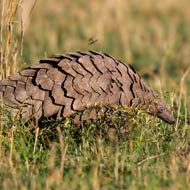Pangolins return to wild after illegal goods seizure

Pangolins are hunted for their scales, which are used in traditional Chinese medicine.
Indonesian authorities released 94 pangolins into the wild last week, after a huge seizure of illegal wildlife goods, Mongabay reports.
Five tons of confiscated pangolin meat were burned in the provincial capital of Medan. Also seized were the live animals and 77kg of pangolin scales.
According to Mongabay, which is part of the Guardian Environment Network, the environment and forestry minister Siti Nurbaya called for harsher punishments to be handed down by judges.
Currently, offenders spend an average of eight months in jail and pay Rp10 million, yet the maximum penalty is five years in prison and Rp500 million ($38,000).
A newborn pangolin's mother and two other animals died shortly after the raid. A team of vets decided the remaining 94 animals were able to return to the wild.
Pangolins' plate-like scales are made from keratin, the same substance as rhino horn. The species is in rapid decline due to demand for its scales in traditional Chinese medicine. Pangolin meat is also considered a delicacy in Vietnam and China.
According to the Zoological Society of London (ZSL), pangolins are the most illegally trafficked animal in the world, with more than a million traded in the past 10 years, despite a commercial trade ban in Asia.



 The BSAVA has opened submissions for the BSAVA Clinical Research Abstracts 2026.
The BSAVA has opened submissions for the BSAVA Clinical Research Abstracts 2026.